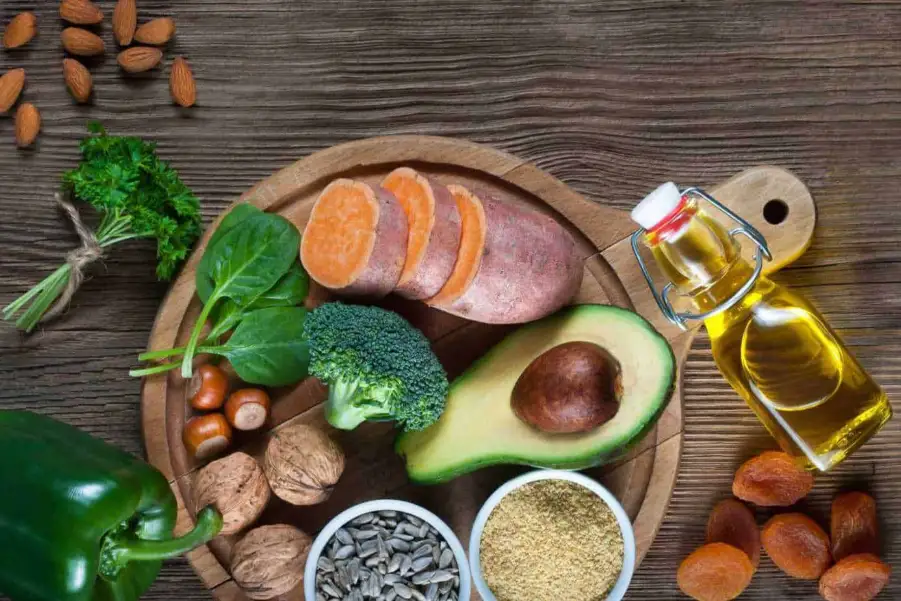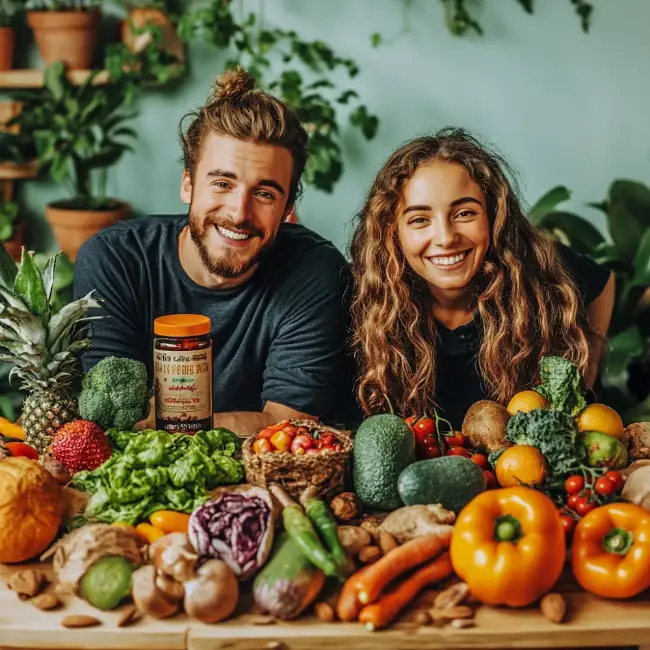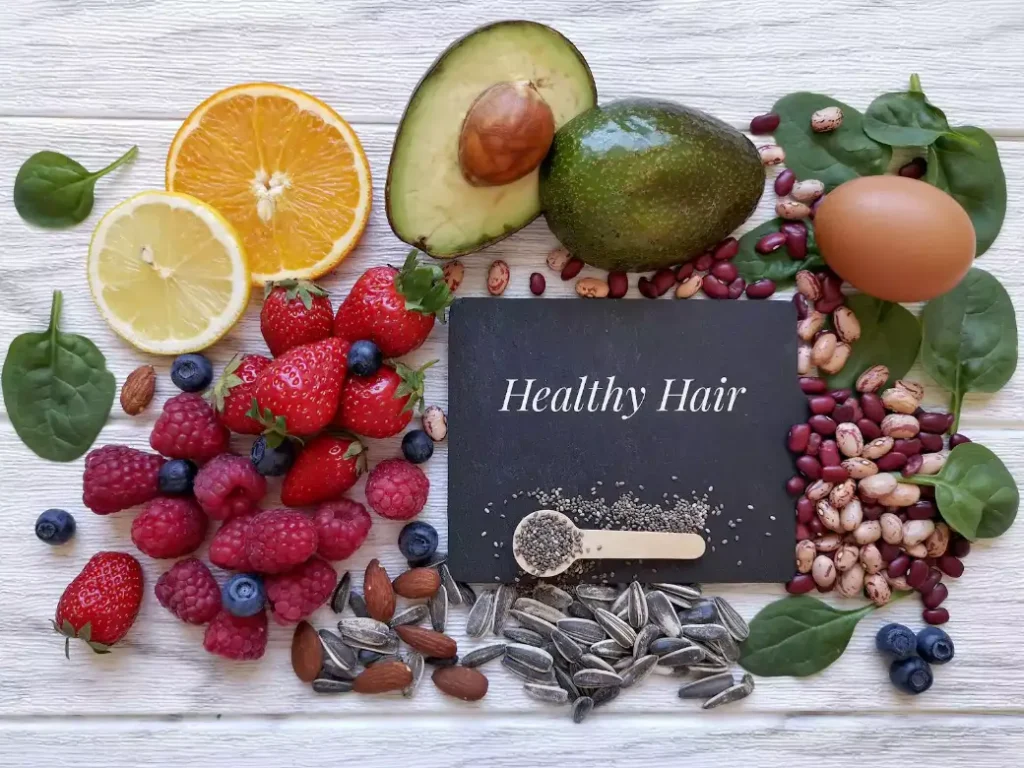More people are switching to plant-based eating for ethical, environmental, and health reasons as vegetarian and vegan diets gain traction. Although these diets have many advantages, some people claim to lose their hair after switching to a plant-based diet. Maintaining good hair on a vegetarian or vegan diet depends mostly on appropriate nutrition. This blog will provide ideas for stopping hair loss and walk you through the critical nutrients needed to keep robust and colourful hair.
Why Hair Loss Can Happen on Vegetarian and Vegan Diets
Vitamin scarcity—which can arise from a plant-based diet—is frequently linked to hair loss. Telogen Effluvium and female pattern alopecia are two of the most often occurring forms of hair loss, the causes of which could be digestible.
- Telogen Effluvium: Normally resulting from pressure, fast weight loss, or nutrient shortages, telogen effluvium is the condition wherein hair follicles the usual time enter the resting phase.
- Female Pattern Baldness: Female Model Hormonal changes and, from time to time, dietary factors can affect hairlessness, causing a decrease in hair density that primarily affects the crown and frontal scalp.
Dermatologist Dr Sarah Reynolds, who specializes in vegan hair health, notes, “Nutritional deficits, especially in iron, zinc, and B-vitamins, can aggravate hair shedding, especially in those following a vegan or vegetarian diet. Stopping hair loss mostly depends on addressing these shortcomings.”
Critical Nutrients for Vegan Hair Health on Plant-Based Diets

Stopping hair loss and promoting good hair growth depend on maintaining appropriate levels of certain nutrients. Following a vegetarian or vegan hair diet calls for you to concentrate on these nutrients.
Iron
Haemoglobin, which drives oxygen to hair follicles and hence stimulates development, is produced from iron. Lack of iron can cause hair to weaken and shed more readily.
Meat’s heme iron is more readily absorbed, although vegans can get their iron requirements from non-heme iron derived from plants. The best references are:
- Lentils
- Spinach
- Seeds (pumpkin, chia)
- Quinoa
- Dark chocolate
To increase absorption, pair meals high in iron with sources of vitamin C, such as citrus fruits.
Trichologist Dr. Kate Montgomery notes, “Iron insufficiency is a major cause of hair thinning, especially in women. A blood test can show whether iron levels are low; if food by itself does not satisfy needs, supplementation could be required.”
Zinc
Then growth and repair of hair tissue depend on zinc. It also keeps the oil glands surrounding the follicles in good operating order. Unfortunately, some plant-based meals contain phytic acid, which reduces zinc absorption, so vegans should eat more foods high in zinc or consider supplementation.
Vegan sources of zinc include:
- Pumpkin seeds
- Cashews:
- chickpeas
- grains overall
Including these in your regular diet will assist avoid deficits. Dr. Reynolds advises “Vegans may require up to 50% more zinc to counter the reduced absorption caused by phytic acid in plant foods.”
Biotin (Vitamin B7)
Next, The protein found in hair, skin, and nails— keratin—is produced in great part by biotin. Brittle and thin hair are linked to a biotin deficiency.
Vegans can find biotin in plant foods, including:
- Sweet potatoes
- Peanuts
- Avocados
- Nutritional yeast
Protein
Hair is primarily made up of keratin, a type of protein. Without enough protein in the diet, hair growth can slow, and hair shafts can weaken, leading to breakage.
Great plant-based protein sources include:
- Tofu and tempeh
- Beans and lentils
- Quinoa
- Soy-based products like edamame and vegan protein powders
Dr. Laura Patterson, a nutritionist, emphasizes, “For healthy hair, it’s essential that vegans get adequate protein from diverse sources. Combine grains and legumes to ensure a complete amino acid profile, which is important for strong hair.”
Lysine
Essential amino acid lysine is vital for the absorption of iron and zinc as well as for the synthesis of collagen, which fortifies hair. Given lysine’s abundance in animal products, vegans have to be deliberate in obtaining enough of it.
Sources of lysine suitable for vegans include:
- Soy products (tofu, tempeh)
- Legumes (chickpeas, lentils, kidney beans)
B-Vitamins
Vital for hair health are vitamins B2, B5, and B12. Particularly B12 is commonly lacking in vegan diets since it is found practically only in animal food. Red blood cell synthesis falls without B12, which reduces oxygen delivery to hair follicles.
Consume fortified foods like nutritional yeast and plant-based milk or a vegan B12 supplement to avoid deficits.
Iodine: Finally
Iodine influences hair development by helping to control thyroid activity. Without including seaweed or iodized salt in their diet, vegans run the danger of iodine shortage. To increase iodine consumption, think about including small amounts of seaweed, such as nori or kelp, in your dishes.
Common Mistakes and Myths About Vegan Diet and Hair Health

One popular belief is that cutting back on hair washing will stop loss. Actually, hair already shedding will still fall out in the wash. Rather than washing less, concentrate on changing your vegan diet and hair to make sure you are obtaining the nutrients required for robust, healthy hair.
Another mistake is depending too much on costly supplements when most nutritional demands can usually be satisfied with a balanced diet. Dr Patterson says, “Expensive hair supplements often don’t offer more benefits than a well-rounded vegan multivitamin combined with a nutrient-rich diet.”
Tips to Prevent Hair Loss on a Plant-Based Diet
On a vegan or vegetarian diet, preventing hair loss and guaranteeing good hair development calls both nutrition and vegetarian hair care a top priority. Here are some straightforward guidelines:
- To check your vitamin levels—particularly for iron, B12, and zinc—get frequent blood testing.
- If you need supplements—especially for B12, iron, and zinc—take them.
- Increase your protein intake from beans, quinoa, and tofu, among other sources.
- To feed the scalp and promote hair development, add vegan hair oils, including black sesame oil, castor oil, and coconut oil.
Vegan-Friendly Vegetarian Hair Care Products for Better Hair Health
Changing to vegan hair dye products can also help to support better hair. Here are some choices to give thought to:
- Natural oils such as black sesame oil, coconut oil, and argan oil can assist the scalp in being nourished and hair development enhanced by vegan hair dye.
- Search for plant-based formulations of vegan hair growth oils that support good hair development and are free of strong chemicals.
- Choose cruelty-free, plant-based vegan hair dyes for vegan hair colour that won’t deprive hair of vital moisture.
Using these products can accentuate a diet high in nutrients for thicker, better hair.
With the proper diet and care, maintaining good vegan hair growth oils hair on a vegetarian or vegan diet is absolutely feasible. Incorporating vegan-friendly vegetarian hair care products like vegan hair growth oils and concentrating on important minerals, including iron, zinc, and protein, will help to maintain good hair development and stop needless shedding. If you see notable hair loss, remember to see a doctor; they can offer individualized recommendations and look for underlying problems.
Your hair speaks to your health; with some dietary changes, you can keep dedicated to a plant-based lifestyle while enjoying vivid, strong hair.

